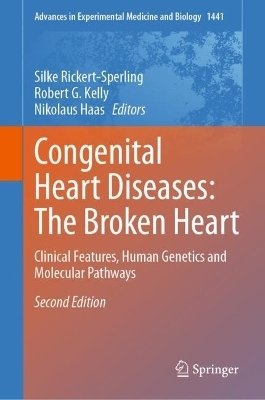
Congenital Heart Diseases: The Broken Heart
Springer International Publishing (Verlag)
978-3-031-44086-1 (ISBN)
This 2nd edition has been extensively updated and provides comprehensive and current insight into congenital heart diseases, from embryonic development through to clinical features, including human genetics and our current knowledge of the underlying molecular pathways.
The book is divided into three parts: an introduction to the development of the heart and its vessels, an overview of the molecular pathways affecting the development of various cardiovascular structures, and a main section focusing on the different types of structural and nonstructural congenital heart diseases, including their clinical features, underlying genetic alterations and insights from animal models and pathways. All chapters have been updated and new chapters added on state-of-the-art approaches including stem cells and organoids, cardiac metabolism, single cell transcriptomics and 3D reconstruction of human heart development. The clinical chapters have been extended and include new sections on diagnostic imaging techniques.
Taken together, the book, written by and for clinicians and researchers, provides an integrated and up-to-date resource for all those who want to learn more about both the clinical aspects and the genetic and molecular basis of congenital heart disease.
lt;p>Silke Rickert-Sperling, MD, is Professor of Cardiovascular Genetics at the Charité - Universitätsmedizin Berlin and coopted professor at the Faculty of Biology, Chemistry and Pharmacy of the Freie Universität Berlin. She leads an interdisciplinary research group at the Experimental and Clinical Research Center of the Charité. Her research focuses on elucidating the molecular mechanisms as well as genetic parameters underlying cardiac development in health and disease.
Robert G. Kelly, PhD, is an Inserm Research Director at Aix Marseille University and a Group Leader in the Developmental Biology Institute of Marseilles. His groups´ research focuses on the cellular and molecular processes regulating development of cardiac progenitor cells, mouse models of congenital heart defects and the establishment of the ventricular conduction system.
Nikolaus Haas, MD, is Professor and Director of the Department of Pediatric Cardiology and Pediatric Intensive Care Medicine at the LMU Klinikum in Munich. The main focuses of his clinical and scientific work are in the interventional treatment of congenital heart defects in all age groups, particularly newborns and premature infants. From 2020 to 2023, he served as President of the German Society for Pediatric Cardiology and Congenital Heart Defects e.V.
Section I: General introduction in cardiac development.- Section II: Different chapters covering the different types of congenital heart disease.- Section III: The overall perspective.
| Erscheinungsdatum | 19.06.2024 |
|---|---|
| Reihe/Serie | Advances in Experimental Medicine and Biology |
| Zusatzinfo | XXXIV, 1112 p. |
| Verlagsort | Cham |
| Sprache | englisch |
| Maße | 155 x 235 mm |
| Themenwelt | Medizin / Pharmazie ► Medizinische Fachgebiete |
| Studium ► 2. Studienabschnitt (Klinik) ► Humangenetik | |
| Schlagworte | Cardiac Development • cardiac malformation • Congenital Heart Disease • genetic cardiac defects • genomics • Heart development • molecular cardiology • Transcriptomics |
| ISBN-10 | 3-031-44086-2 / 3031440862 |
| ISBN-13 | 978-3-031-44086-1 / 9783031440861 |
| Zustand | Neuware |
| Informationen gemäß Produktsicherheitsverordnung (GPSR) | |
| Haben Sie eine Frage zum Produkt? |
aus dem Bereich


